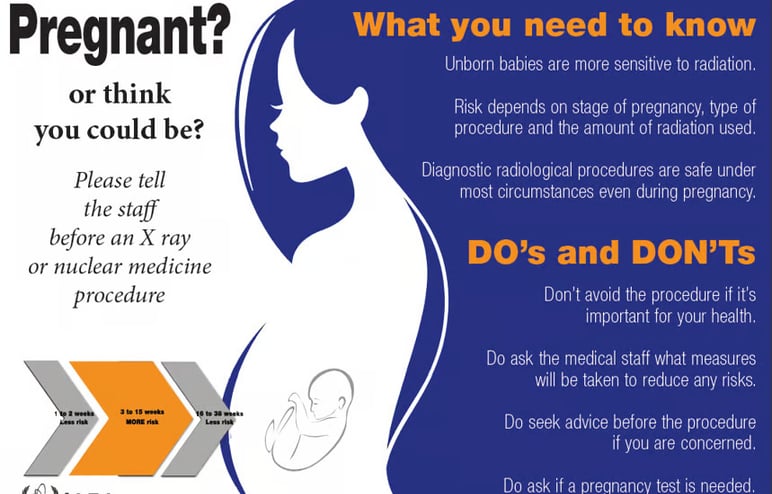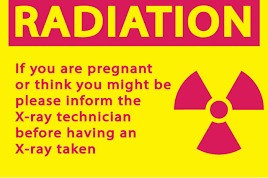Why Pregnant Women Should Avoid X-rays
Pregnancy is a crucial period in a woman’s life, and every decision regarding her health and the health of her baby must be carefully considered. One of the common concerns that arise during pregnancy is whether it’s safe to undergo an X-ray. While X-rays are widely used for diagnostic purposes, they pose potential risks to a developing fetus, especially in the early stages of pregnancy. In this blog, we will explore why pregnant women should avoid X-rays, the potential risks involved, and alternative imaging options.
3/3/20253 min read


What Is an X-ray and How Does It Work?
X-rays are a form of electromagnetic radiation used in medical imaging to create pictures of the inside of the body. These images help doctors diagnose injuries, infections, or diseases. X-rays work by passing radiation through the body to capture images of bones, organs, and tissues.
While X-rays are incredibly useful, they also involve exposure to ionizing radiation, which has the potential to damage cells and tissues. When pregnant women undergo X-rays, the radiation can affect the developing fetus, which is why precautions are essential.
The Risks of X-ray Exposure During Pregnancy
Impact on the Fetus: The primary concern with X-ray exposure during pregnancy is the potential harm it can cause to the fetus. The developing fetus is highly sensitive to radiation, especially in the early stages of pregnancy (first trimester). The radiation can disrupt cellular development and increase the risk of birth defects or developmental issues.
Miscarriage: High levels of radiation during pregnancy may also increase the risk of miscarriage. Although the risk from a single X-ray exposure is typically small, repeated or high-dose exposure can have more significant consequences on pregnancy.
Developmental Problems: If a pregnant woman is exposed to X-rays during critical stages of fetal development, it can affect the baby’s organs, limbs, or brain. This can lead to congenital abnormalities or developmental delays.
Cancer Risk: Although the likelihood is low, exposure to radiation during pregnancy may slightly increase the baby’s future risk of developing cancer later in life. This is why doctors avoid using X-rays for pregnant women unless absolutely necessary.
Alternatives to X-rays During Pregnancy
While X-rays are sometimes necessary for diagnosing certain conditions, there are alternative imaging techniques that are safer for pregnant women:
Ultrasound: Ultrasound uses sound waves, not radiation, to create images of the inside of the body. It’s the most commonly used imaging technique during pregnancy and is completely safe for both the mother and the baby. Ultrasounds are used to monitor fetal growth, check the baby’s heartbeat, and assess the placenta’s position.
MRI (Magnetic Resonance Imaging): MRI uses magnetic fields and radio waves to create detailed images of the body without the use of ionizing radiation. While MRI is generally safe during pregnancy, it should only be used when medically necessary and with precautions, as it may not be recommended during the first trimester in some cases.
Other Non-Radiation Tests: In many cases, doctors may opt for non-radiation tests like blood tests, urine tests, or physical examinations to diagnose certain conditions instead of relying on X-rays.
When Is It Safe to Get an X-ray During Pregnancy?
There are certain situations where X-rays may be necessary during pregnancy, but it should always be done with careful consideration. If a pregnant woman has a medical emergency, such as a serious injury or infection, an X-ray might be required for proper diagnosis and treatment. In such cases, the doctor will take steps to minimize radiation exposure, such as using lead shields to protect the abdomen or limiting the area of the body that is X-rayed.
It's important to inform your healthcare provider if you are pregnant or suspect you might be, before undergoing any imaging procedure. Doctors usually take extra precautions or choose alternative methods to ensure the safety of both mother and baby.
Guidelines from Medical Experts
Health organizations like the American College of Obstetricians and Gynecologists (ACOG) and the World Health Organization (WHO) recommend that unnecessary exposure to ionizing radiation, including X-rays, should be avoided during pregnancy. However, if an X-ray is medically necessary, the benefits may outweigh the potential risks. It's important to follow your doctor's guidance and to ensure that the X-ray procedure is done safely with the least amount of radiation exposure possible.




Reference Website Link:
American College of Obstetricians and Gynecologists (ACOG) - Radiation During Pregnancy
Link: https://www.acog.orgWorld Health Organization (WHO) - Ionizing Radiation and Pregnancy
Link: https://www.who.intRadiologyInfo.org - Imaging During Pregnancy
Link: https://www.radiologyinfo.orgCenters for Disease Control and Prevention (CDC) - Radiation and Pregnancy
Link: https://www.cdc.gov
